*/
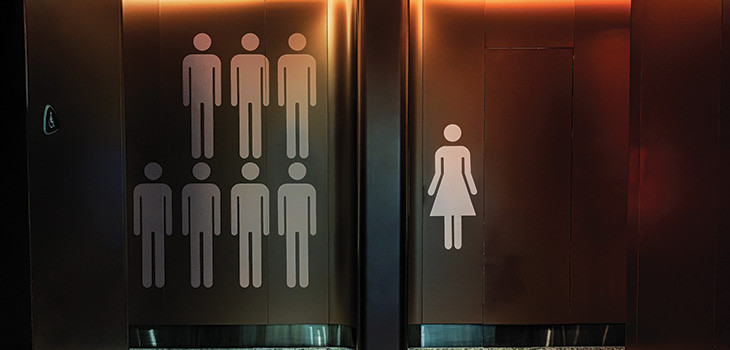
A win for the North Eastern Circuit’s Women’s Forum – the campaign led by Kama Melly KC for equitable toilet provision at Leeds Crown Court
Until very recently, the women’s bathroom at Leeds Crown Court’s Robing Room had just one cubicle. The men’s bathroom, in contrast, had four urinals and three cubicles, meaning that the ratio of facilities for men to women was 7:1. It is something of an understatement to say that feelings towards this provision and ratio were running high.
Leeds Combined Court Centre opened in 1982 and the very small size of the women’s bathroom in comparison to the men’s was, no doubt, a historical legacy reflecting the size of the female Bar in the 1970/80s. The position today, however, is very different. Women have made up roughly 50% of pupil barristers for the last 25 years and now make up two-thirds of applicants to study law.
We used to have two cubicles but plumbing issues forced a refurbishment that reduced this to one. HM Courts and Tribunals Service (HMCTS) indicated that there would be a renovation but lack of funding and the low priority meant there was little chance this would happen any time soon. The North Eastern Circuit Women’s Forum was able to show why women need more provision than men and that a swap would serve us well in the short term.
Obviously, there were objections from the men… but the women won! Now, we have a spacious women’s bathroom with three cubicles and even room for a chair from which to nurse or express milk. We have added flowers, tampons and deodorant etc and, for a grand opening on 15 May, decorated our new facilities with flags in suffragette colours.
I am grateful to HMCTS for their willingness to engage with the Women’s Forum on this issue. In sharing the details of our campaign in Counsel magazine we hope to inspire others – who may be similarly hampered and enraged by inadequate female toilet provision in robing rooms across the country – to press for fair provision.
While the 7:1 ratio was, of course, an extraordinary demonstration of unequal provision, it is also important to recognise that to make facilities equitable, women need significantly more toilet provision than men. This is why:
On average, women require up to 2.3 times longer in the bathroom than men.* This statistic does not take into account the fact that when dressed in full court attire, a female barrister has to adjust her gown, formal suit and tights – all in all, a much longer process than undoing a fly. In silk, a jacket with tails is worn that usually has a number of hook and eye closures.
The overwhelming majority of the female Bar is under 50. Most are self-employed practitioners and therefore have no maternity pay. It follows that women work long into their pregnancies and have returned to work full time soon after giving birth. Pregnancy causes a significant reduction in bladder capacity and, post pregnancy, many women have weaker bladders and cannot wait as long as men can to use the toilet. Female barristers, myself included, have used the robing room female bathroom as a place to express milk. Sadly, women have had miscarriages here.
Around a quarter of women of childbearing age will have their period at any one time and need longer in the bathroom in order to use sanitary products. The chances of streptococcal toxic shock syndrome from sanitary protection are increased if there are no toilets available to change tampons. There are times when, either because of a heavy or unexpected period (particularly experienced by peri-menopausal or menopausal women) a woman requires a much longer time in the cubicle. Knowing that there is a queue of women, all dependent on your speed, adds to the stress of this experience.
Needing access to one’s own sanitary products/expressing machine means that women require access to toilet facilities close to where they keep their bags and personal possessions. In our case, a suggestion that we use toilets on a different floor was impractical for this reason.
Women are eight times as likely as men to endure a urinary tract infection which increases the frequency with which a toilet is required. Lack of facilities can cause women to delay emptying their bladder. Canadian and British studies into the impact of the closure of public toilets revealed that referrals for urinary tract infections, problems with distended bladders, and a range of other urogynaecology problems have increased proportionately to toilet closure (Greed 2019).**
It is evident that the impact of inadequate facilities on women is substantial. In addition, the Criminal Bar is under incredible pressure, with breaks and lunchtimes requiring conferences, attendance notes, emails etc. It is hugely unfair that women barristers’ break times be effectively shorter than their male counterparts because of the time wasted queuing for a single toilet.
Add to this the significant psychological impact of knowing that a workplace is willing to condone a ratio such as 7:1. The sense of unfairness, based on sex, being so visible and causing such inconvenience engenders a sense of real anger in those discriminated against – and is particularly difficult to bear when working under pressure in an adversarial system.
It is important that the government supports women in the legal profession. Even in 2023, it is hard for women to feel valued at work and ‘worthy’ of striving for the most senior positions. We know that women face discrimination and prejudice at the Bar. For the women practising in Leeds it is a welcome change to see one of the physical manifestations of that unfairness removed.
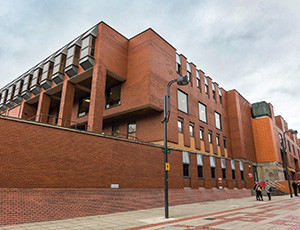
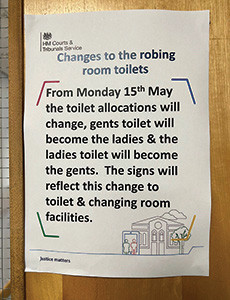
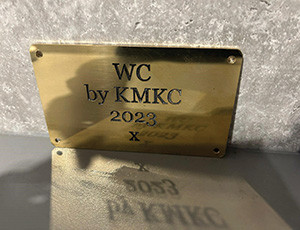
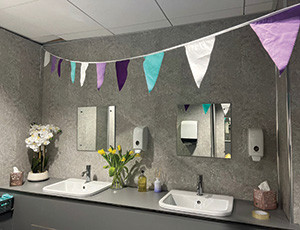
Pictured above: Signs announcing the changeover day on 15 May; a surprise plaque organised by women barristers (Rukhshanda Hussain in the main) thanking Kama Melly KC for leading the campaign; the ‘new loos’, filled with flowers, tampons and deodorant and, for their grand opening, decorated with flags in ‘suffragette’ colours. Images reproduced with the permission of HMCTS.
References
*Invisible Women by Caroline Criado Perez, citing ‘Toilets as a feminist issue: a true story’, Berkeley Women’s Law Journal, Taunya Lovell Banks. ** 'Join the queue: Including women’s toilet needs in public space', The Sociological Review, Vol 67 Issue 4, Clara Greed 2019.

Until very recently, the women’s bathroom at Leeds Crown Court’s Robing Room had just one cubicle. The men’s bathroom, in contrast, had four urinals and three cubicles, meaning that the ratio of facilities for men to women was 7:1. It is something of an understatement to say that feelings towards this provision and ratio were running high.
Leeds Combined Court Centre opened in 1982 and the very small size of the women’s bathroom in comparison to the men’s was, no doubt, a historical legacy reflecting the size of the female Bar in the 1970/80s. The position today, however, is very different. Women have made up roughly 50% of pupil barristers for the last 25 years and now make up two-thirds of applicants to study law.
We used to have two cubicles but plumbing issues forced a refurbishment that reduced this to one. HM Courts and Tribunals Service (HMCTS) indicated that there would be a renovation but lack of funding and the low priority meant there was little chance this would happen any time soon. The North Eastern Circuit Women’s Forum was able to show why women need more provision than men and that a swap would serve us well in the short term.
Obviously, there were objections from the men… but the women won! Now, we have a spacious women’s bathroom with three cubicles and even room for a chair from which to nurse or express milk. We have added flowers, tampons and deodorant etc and, for a grand opening on 15 May, decorated our new facilities with flags in suffragette colours.
I am grateful to HMCTS for their willingness to engage with the Women’s Forum on this issue. In sharing the details of our campaign in Counsel magazine we hope to inspire others – who may be similarly hampered and enraged by inadequate female toilet provision in robing rooms across the country – to press for fair provision.
While the 7:1 ratio was, of course, an extraordinary demonstration of unequal provision, it is also important to recognise that to make facilities equitable, women need significantly more toilet provision than men. This is why:
On average, women require up to 2.3 times longer in the bathroom than men.* This statistic does not take into account the fact that when dressed in full court attire, a female barrister has to adjust her gown, formal suit and tights – all in all, a much longer process than undoing a fly. In silk, a jacket with tails is worn that usually has a number of hook and eye closures.
The overwhelming majority of the female Bar is under 50. Most are self-employed practitioners and therefore have no maternity pay. It follows that women work long into their pregnancies and have returned to work full time soon after giving birth. Pregnancy causes a significant reduction in bladder capacity and, post pregnancy, many women have weaker bladders and cannot wait as long as men can to use the toilet. Female barristers, myself included, have used the robing room female bathroom as a place to express milk. Sadly, women have had miscarriages here.
Around a quarter of women of childbearing age will have their period at any one time and need longer in the bathroom in order to use sanitary products. The chances of streptococcal toxic shock syndrome from sanitary protection are increased if there are no toilets available to change tampons. There are times when, either because of a heavy or unexpected period (particularly experienced by peri-menopausal or menopausal women) a woman requires a much longer time in the cubicle. Knowing that there is a queue of women, all dependent on your speed, adds to the stress of this experience.
Needing access to one’s own sanitary products/expressing machine means that women require access to toilet facilities close to where they keep their bags and personal possessions. In our case, a suggestion that we use toilets on a different floor was impractical for this reason.
Women are eight times as likely as men to endure a urinary tract infection which increases the frequency with which a toilet is required. Lack of facilities can cause women to delay emptying their bladder. Canadian and British studies into the impact of the closure of public toilets revealed that referrals for urinary tract infections, problems with distended bladders, and a range of other urogynaecology problems have increased proportionately to toilet closure (Greed 2019).**
It is evident that the impact of inadequate facilities on women is substantial. In addition, the Criminal Bar is under incredible pressure, with breaks and lunchtimes requiring conferences, attendance notes, emails etc. It is hugely unfair that women barristers’ break times be effectively shorter than their male counterparts because of the time wasted queuing for a single toilet.
Add to this the significant psychological impact of knowing that a workplace is willing to condone a ratio such as 7:1. The sense of unfairness, based on sex, being so visible and causing such inconvenience engenders a sense of real anger in those discriminated against – and is particularly difficult to bear when working under pressure in an adversarial system.
It is important that the government supports women in the legal profession. Even in 2023, it is hard for women to feel valued at work and ‘worthy’ of striving for the most senior positions. We know that women face discrimination and prejudice at the Bar. For the women practising in Leeds it is a welcome change to see one of the physical manifestations of that unfairness removed.




Pictured above: Signs announcing the changeover day on 15 May; a surprise plaque organised by women barristers (Rukhshanda Hussain in the main) thanking Kama Melly KC for leading the campaign; the ‘new loos’, filled with flowers, tampons and deodorant and, for their grand opening, decorated with flags in ‘suffragette’ colours. Images reproduced with the permission of HMCTS.
References
*Invisible Women by Caroline Criado Perez, citing ‘Toilets as a feminist issue: a true story’, Berkeley Women’s Law Journal, Taunya Lovell Banks. ** 'Join the queue: Including women’s toilet needs in public space', The Sociological Review, Vol 67 Issue 4, Clara Greed 2019.
A win for the North Eastern Circuit’s Women’s Forum – the campaign led by Kama Melly KC for equitable toilet provision at Leeds Crown Court


The Chair of the Bar sets out how the new government can restore the justice system
In the first of a new series, Louise Crush of Westgate Wealth considers the fundamental need for financial protection
Unlocking your aged debt to fund your tax in one easy step. By Philip N Bristow
Possibly, but many barristers are glad he did…
Mental health charity Mind BWW has received a £500 donation from drug, alcohol and DNA testing laboratory, AlphaBiolabs as part of its Giving Back campaign
The Institute of Neurotechnology & Law is thrilled to announce its inaugural essay competition
How to navigate open source evidence in an era of deepfakes. By Professor Yvonne McDermott Rees and Professor Alexa Koenig
Brie Stevens-Hoare KC and Lyndsey de Mestre KC take a look at the difficulties women encounter during the menopause, and offer some practical tips for individuals and chambers to make things easier
Sir Geoffrey Vos, Master of the Rolls and Head of Civil Justice since January 2021, is well known for his passion for access to justice and all things digital. Perhaps less widely known is the driven personality and wanderlust that lies behind this, as Anthony Inglese CB discovers
The Chair of the Bar sets out how the new government can restore the justice system
No-one should have to live in sub-standard accommodation, says Antony Hodari Solicitors. We are tackling the problem of bad housing with a two-pronged approach and act on behalf of tenants in both the civil and criminal courts